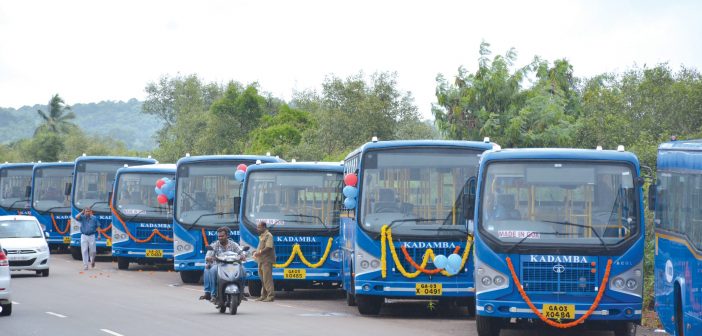As the festive and vacation season sweeps across India, private bus companies have come under scrutiny for charging exorbitant fares on popular routes, far surpassing even airfares. Travelers, particularly those returning to their hometowns for Diwali or taking vacations, are facing a financial pinch as bus operators exploit the heightened demand. Routes like Mumbai to Belagavi have seen fare hikes as high as ₹3,000, nearly equivalent to airfares, where a last-minute flight can cost around ₹3,200.
Case Study: Mumbai to Belagavi
One of the starkest examples is the Mumbai-Belagavi route, where private bus operators are charging between ₹2,800 to ₹3,500 for a one-way ticket. This sharp rise is particularly evident during the Diwali season. Comparatively, flights on the same route are available for ₹3,200 to ₹3,500, depending on booking timing. The fact that bus fares have reached parity with flight prices, known for their speed and comfort, highlights the excessive demand-driven exploitation by bus companies.
Other High-Fare Routes
The Mumbai-Belagavi route is not an isolated case. Here are other routes where passengers are paying inflated fares during this season:
- Bangalore to Hyderabad: Normally priced at ₹900 to ₹1,200, bus fares on this route have surged to ₹2,500 to ₹3,000 due to the combined impact of Dasara and Diwali, which see a large number of people traveling back home.
- Chennai to Madurai: During the festive season, buses charge ₹2,000 to ₹2,500 for a journey typically priced at ₹800 to ₹1,200. This route is crucial for travelers heading home for Pongal or Diwali, leading to fare hikes.
- Delhi to Lucknow: Fares have jumped to ₹2,700 to ₹3,200, compared to the usual fare of ₹1,200 to ₹1,500. Passengers prefer buses due to the limited availability of trains and the last-minute high airfare surge.
- Kolkata to Siliguri: This route, vital for vacation-goers heading to the hills, has seen a fare increase from ₹1,000 to ₹3,000, with private operators taking advantage of the seasonal spike in demand.
- Pune to Goa: A much-frequented route during festive holidays and long weekends, fares have soared to ₹3,500 from a regular ₹1,200 to ₹1,800.
Why Are Bus Fares So High?
The surge in bus fares can be attributed to multiple factors, including:
- High Festive Demand: The Diwali season, along with other festivals like Dussehra, sees a massive influx of people traveling to their hometowns or holiday destinations. This demand-supply imbalance pushes operators to hike fares significantly.
- Train Unavailability: Indian Railways, though a popular choice for long-distance travel, often struggles to accommodate the rush during festive seasons. Trains are booked out months in advance, and waitlist tickets rarely clear during peak times, leaving travelers with no choice but to opt for private buses.
- Dynamic Pricing by Bus Operators: Much like airlines, many private bus operators have adopted dynamic pricing models that allow them to raise fares as demand spikes. This practice, while common in aviation, has led to unaffordable pricing in buses, which are traditionally considered an economical travel option.
- Monopoly of Private Operators: On certain routes, particularly in tier-2 and tier-3 cities, private bus companies face little competition from state transport, giving them a virtual monopoly during high-demand periods.
- Fuel Price Volatility: Rising fuel costs have also contributed to the fare surge. Even though operators cite fuel price increases as a factor, the fare hikes during festive times far exceed the justified margin of increase, indicating an element of price gouging.
- Poor Regulation and Oversight: The lack of stringent fare regulation allows private bus operators to charge as they wish during peak travel seasons. In many cases, passengers have no choice but to pay inflated prices as there is no governmental body actively regulating bus fares, unlike airfares or train tickets.
The Impact on Passengers
For many, especially the middle class and daily wage workers who rely on buses for affordable transport, these fare hikes are causing significant financial strain. The price disparity is particularly challenging for travelers who make multiple trips or need to travel with their families. Many passengers have voiced concerns about the lack of alternatives and have reluctantly paid high prices, while others have postponed or canceled their travel plans altogether.
Additionally, the sudden rise in bus fares has spurred travelers to turn towards unregulated private vehicles and carpooling, leading to an increase in illegal travel services, which pose safety risks.
The Role of State Transport Services
While state transport corporations like MSRTC (Maharashtra State Road Transport Corporation) and KSRTC (Karnataka State Road Transport Corporation) continue to operate buses during the festive rush, their capacity is limited, and they struggle to meet the overwhelming demand. Many state-run services are fully booked weeks in advance, driving passengers into the hands of private operators.
In response, state governments have occasionally tried to run special festival buses, but these services remain insufficient to address the passenger volume fully. Moreover, some state-run services are prone to delays, further compelling travelers to choose private options despite the high costs.
Conclusion: A Need for Regulation
The practice of exorbitant fare hikes by private bus companies during festive and vacation rush periods underscores the need for stronger regulations and better oversight of pricing in the transport sector. While high demand is a natural factor for price increases, the levels seen during this season, where bus fares approach or even exceed airfares, are a clear sign of an unregulated market.
To protect passengers from price exploitation, there is an urgent need for government intervention to establish fare caps or to enhance state-run transport services during peak seasons, providing more affordable alternatives for the masses.




